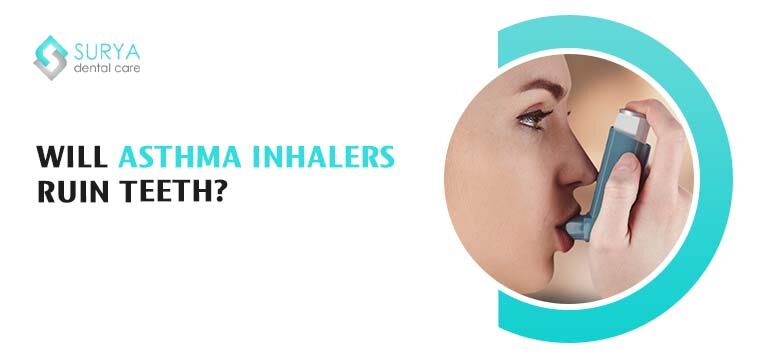
As asthma shrinks the bronchial tubes inside the lungs and fills them with mucus, airflow obstruction occurs. Thus lung disease interferes with swallowing and liquid entrance. It means people with asthma would struggle to swallow pills or fluids to control asthma. Hence people with this respiratory illness have to breathe in the medications through inhalers.
Asthma Inhalers are portable devices designed to deliver medications directly to the lungs of asthma patients.
Do you know lungs and the oral cavity have a two-way connection? Improper dental care increases the risk of developing lung diseases. Similarly, frequent use of inhalers to reduce asthma flare-ups also affects your mouth. Keep reading to know how the impact of inhalers on your dental health.
How do asthma inhalers affect your dental health?
You can have different inhalers like metered-dose inhalers, dry powder inhalers, and soft mist inhalers to get the needed respiratory relief. The medicines in the apparatus will go straight into the airways when breathing in. When the medication is breathed in regularly using inhalers, it will irritate tissues at the back of the mouth roof.
Over time, reddish sore spots appear there and become infected. If you are using an inhaler, you might sometimes notice soreness in your throat. Right?
Similarly, regular use of inhalers provokes various oral complications as follows:
- Oral Thrush – The drugs breathed in through inhalers are powerful to upset the microbial balance inside the mouth. When it happens, candida (a fungus) tends to overgrow and cause oral thrush. It causes white patches on the tongue, inside of the chins, and other oral tissues. Luckily, it is not contagious and can be treated with antifungal medications.
- Dry mouth – Similar to the oral microbiome imbalance, inhaled medications can absorb saliva from the patient’s mouth. Their mouths’ pH balance is disrupted in such circumstances. Consequently, they encounter dryness and a burning sensation in their mouth.
- Cavities – Oral bacteria in our mouth thrive when salivary flow is lessened. Saliva is a natural cleaning agent that cleans away bacteria and food leftovers trapped in the mouth and protects teeth from acids produced by harmful oral microbes. When your mouth does not produce enough saliva, your teeth cannot get the natural shield from saliva, so decay in teeth occurs.
- Gum Disease – Many asthma patients develop gum diseases due to inhalers. Apart from making your mouth a breeding ground for oral bacteria, some medications and fluids taken through inhalers can cause more plaque (a sticky form of bacteria) around the gum line. If left untreated, it will infect the gums and progress to an advanced stage called “Periodontitis.”
How to prevent such oral health problems caused by asthma inhalers?
If you feel any abnormalities in your mouth after using inhalers, consider your doctor to get a new inhaler or medicine. It will prevent teeth, gums, and oral tissues from allergic reactions caused by inhaled therapy.
We advise every asthma inhaler user should rinse their mouth thoroughly after each inhalation o safeguard their teeth and gums.
Whether using inhalers to cope with asthma, COPD, or other respiratory illness, you should keep hydrated and maintain a good dental cleaning routine.
Bottom line
You should use the inhaler properly to enjoy its medication efficacy. Otherwise, the lung disease will worsen. Similarly, you should take care of your mouth properly during the inhalation treatment. Otherwise, the inhaler will lead to several dental issues.
Do you have queries or want more tips for using inhalers to protect your oral cavity? Schedule your appointment with our Trichy dentists right now here.



